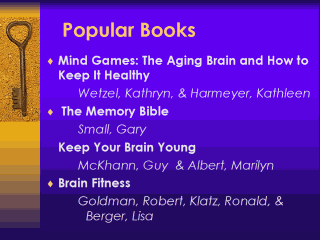| front |1 |2 |3 |4 |5 |6 |7 |8 |9 |10 |11 |12 |13 |14 |15 |16 |17 |18 |19 |20 |21 |22 |23 |24 |25 |26 |27 |28 |29 |30 |31 |32 |33 |34 |35 |36 |37 |38 |39 |40 |41 |42 |43 |44 |review |
 |
So take a look at some of these popular books. Iíve
acquired a good number of books in the popular literature that addresses topics of
preserving cognition in aging. Iíve read most of them. Even just looking at the titles
Mind Games: The Aging Brain and How to Keep It Healthy. Theyíre keeping the brain
healthy. The Memory Bible. Gary Small is a physician but using the word bible and memory together I think has a lot of connotations for our culture.The Memory Bible does present a lot of legitimate coping strategies Ė things to do about memory and memory changes. I kind of bristled at calling it a bible; it just seemed like it was supposed to be the final answer, but there is some good stuff in there. Keep Your Brain Young. Brain Fitness. We want to apply the expertise from our exercising friends now to the brain. Keep Your Brain Young is a fairly tempered description of a wide variety of coping strategies, healthy lifestyle issues, everyday memory strategies that people can use without a lot of training and expertise that made some sense. |